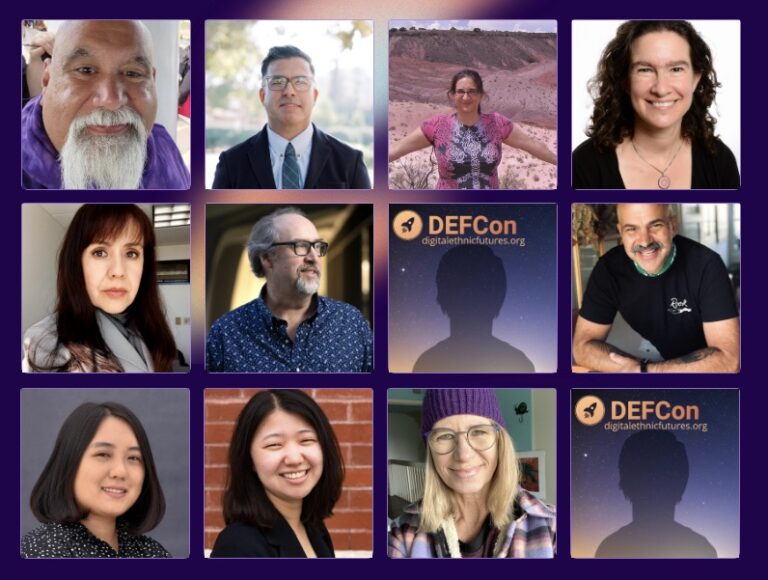Student Research Fellowship
4-month fellowship
with a $1,200 Stipend
Mentorship and support for ⚡️faculty & staff✨ engaging in digital scholarship
Mentoring and practicum experiences for ✨students
Support for ✨new curriculum development in digital ethnic studies fields
With the generous support of the Andrew W. Mellon Foundation, this will be the third year that CSUF DEFCon is disbursing grants and fellowships to support CSUF faculty, staff and students on original research projects, community-engaged activities, and new curricular developments at the intersection of digital humanities and ethnic studies fields.
Deadline to apply: Dec 21 extended: Jan 2, 2024
Notified by: Jan 19, 2024
SAVE ONE of these DATES:
SAVE THESE DATES:
In addition to stipends, all CSUF DEFCon fellows benefit from…
Register for an upcoming Info Session:
Tue Oct 31 • 10-11am PST
Tue Nov 28 • 10-11am PST
(Coming soon)
Read the FAQ↓

Meet the faculty, staff and students who advanced their digital scholarship last year with CSUF DEFCon.
Graduate & undergraduate fellows develop the essential skills, professional training, career experience, and mentorship needed to become the next generation of social justice and community-engaged digital scholars. You will work with a faculty mentor to develop project timelines and budgets, experiment with emerging technologies, collaborate in interdisciplinary settings, develop new modes of inquiry, and become vital members of a dynamic community of practice at CSUF.
Learn More & Apply →These fellowships are designed to support researchers at emerging stages of their digital scholarly practice. Individuals selected for this award will pursue research topics that center the voices and experiences of ethnic communities, past, present and future; while also integrating digital tools, digital data creation/curation, and new media technologies in transformative, justice oriented, and socially responsible ways.
Learn More & Apply →These flexible-length fellowships are designed to equip graduate, undergraduate, and early career scholars from across the university with essential skills, professional training, and mentorship needed to become the next generation of social justice and community-engaged digital scholars. Fellows receive a minimum of 6 weeks of DH professional development training and mentorship; fellow may engage in group and one-on-one mentoring sessions with the DEFCon team.
Learn More & Apply →Digital scholarship can bridge academic siloes and establish more collaborative models for teaching, research, and community building. These fellowships support teams of two or more CSUF faculty/staff to design new courses and curricular resources that explore topics from one or more ethnic studies fields (Black, Indigenous, Latinx, and Asian American studies) and the digital humanities.
Learn More & Apply →Fellowships FAQ
Yes. While digital scholarly practices incorporate key elements of the Digital Humanities including working in multidisciplinary and collaborative environments, digital scholars can be found across the academic setting, as digital scholarship is a methodological choice that informs how we engage new technologies to create, locate, assemble, understand and share our data.
Digital scholarship is therefore not limited to the humanities, but rather invites technologists, humanists, mathematicians, geographers, natural and social scientists and others to think, explore and create new scholarship that is both collaborative and digital.
Digital scholarship can include the use of: data visualization, network analysis, digital storytelling, gaming, text-analytic techniques, GIS/mapping, digital exhibits, and data-mining.
Yes. Collaborators for the course collaboration fellowship can come in many combinations including full-time faculty working with contingent faculty, staff working with faculty, or all contingent faculty working together etc. The only requirement is that all collaborators need to be employed at least part time at CSUF. Students, including graduate students cannot serve as course collaborators.
Yes, faculty & staff applicants can submit proposals for both funding opportunities, but the proposals must be different in scope. If you are unsure of which fellowship is right for you, please reach out and we would be happy to help talk through your ideas. Email d.h@fullerton.edu
You can certainly share the name(s) of students with whom you would like to work with during your fellowship period, but student fellows will have to complete a separate Student Fellowship application. We can’t guarantee student fellow assignments ahead of time, but will take all available information shared with us into consideration when reviewing your proposal.
“The digital ethnic studies field brings together critiques of racial capitalism, community-engaged approaches to research, and digital humanities methodologies. Complementing work in discrete fields like Black and Latinx digital humanities, digital ethnic studies draws on the affordances of ethnic studies, an interdisciplinary examination of difference that foregrounds race, ethnicity, and indigeneity through a comparative framework. Moreover, digital ethnic studies places at its forefront the community-engaged research practices that are integral to ethnic studies and its commitment to research with (not on) communities.”
—Digital Ethnic Futures Consortium
Here are a few terms used in our materials above, found in the Keywords in Digital Pedagogy in the Humanities:
Great question. As a three-year grant initiative, CSUF DEFCon is now in its 3rd year. We would like to continue to offer these fellowships after this 2023-24 academic year, but we cannot guarantee that they will be offered in this same capacity next year.
Reach out to us! d.h@fullerton.edu
Keep up with our different projects on Instagram and the web. And reach out to connect about other digital humanities projects!
d.h@fullerton.edu or jmoorepewu@fullerton.edu